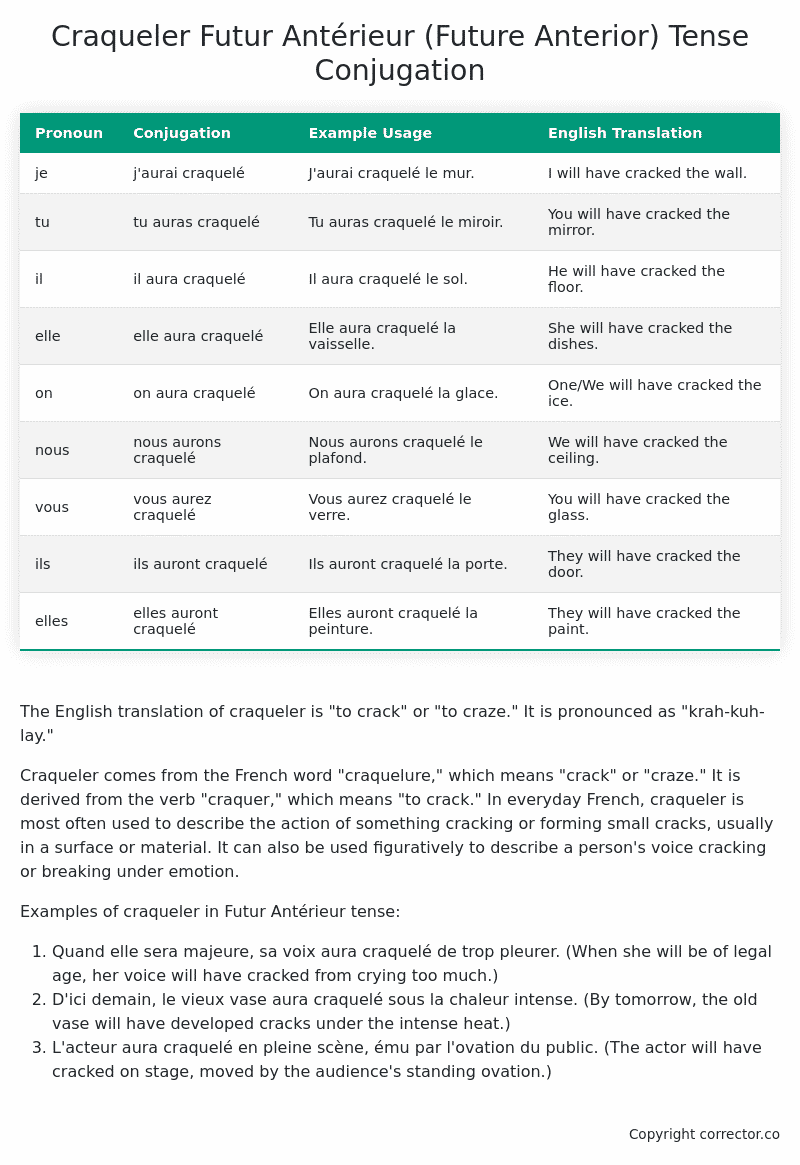Futur Antérieur (Future Anterior) Tense Conjugation of the French Verb craqueler
Introduction to the verb craqueler
The English translation of craqueler is “to crack” or “to craze.” It is pronounced as “krah-kuh-lay.”
Craqueler comes from the French word “craquelure,” which means “crack” or “craze.” It is derived from the verb “craquer,” which means “to crack.” In everyday French, craqueler is most often used to describe the action of something cracking or forming small cracks, usually in a surface or material. It can also be used figuratively to describe a person’s voice cracking or breaking under emotion.
Examples of craqueler in Futur Antérieur tense:
- Quand elle sera majeure, sa voix aura craquelé de trop pleurer. (When she will be of legal age, her voice will have cracked from crying too much.)
- D’ici demain, le vieux vase aura craquelé sous la chaleur intense. (By tomorrow, the old vase will have developed cracks under the intense heat.)
- L’acteur aura craquelé en pleine scène, ému par l’ovation du public. (The actor will have cracked on stage, moved by the audience’s standing ovation.)
Table of the Futur Antérieur (Future Anterior) Tense Conjugation of craqueler
| Pronoun | Conjugation | Example Usage | English Translation |
|---|---|---|---|
| je | j’aurai craquelé | J’aurai craquelé le mur. | I will have cracked the wall. |
| tu | tu auras craquelé | Tu auras craquelé le miroir. | You will have cracked the mirror. |
| il | il aura craquelé | Il aura craquelé le sol. | He will have cracked the floor. |
| elle | elle aura craquelé | Elle aura craquelé la vaisselle. | She will have cracked the dishes. |
| on | on aura craquelé | On aura craquelé la glace. | One/We will have cracked the ice. |
| nous | nous aurons craquelé | Nous aurons craquelé le plafond. | We will have cracked the ceiling. |
| vous | vous aurez craquelé | Vous aurez craquelé le verre. | You will have cracked the glass. |
| ils | ils auront craquelé | Ils auront craquelé la porte. | They will have cracked the door. |
| elles | elles auront craquelé | Elles auront craquelé la peinture. | They will have cracked the paint. |
Other Conjugations for Craqueler.
Le Present (Present Tense) Conjugation of the French Verb craqueler
Imparfait (Imperfect) Tense Conjugation of the French Verb craqueler
Passé Simple (Simple Past) Tense Conjugation of the French Verb craqueler
Passé Composé (Present Perfect) Tense Conjugation of the French Verb craqueler
Futur Simple (Simple Future) Tense Conjugation of the French Verb craqueler
Futur Proche (Near Future) Tense Conjugation of the French Verb craqueler
Plus-que-parfait (Pluperfect) Tense Conjugation of the French Verb craqueler
Passé Antérieur (Past Anterior) Tense Conjugation of the French Verb craqueler
Futur Antérieur (Future Anterior) Tense Conjugation of the French Verb craqueler (this article)
Subjonctif Présent (Subjunctive Present) Tense Conjugation of the French Verb craqueler
Subjonctif Passé (Subjunctive Past) Tense Conjugation of the French Verb craqueler
Subjonctif Imparfait (Subjunctive Imperfect) Tense Conjugation of the French Verb craqueler
Subjonctif Plus-que-parfait (Subjunctive Pluperfect) Tense Conjugation of the French Verb craqueler
Conditionnel Présent (Conditional Present) Tense Conjugation of the French Verb craqueler
Conditionnel Passé (Conditional Past) Tense Conjugation of the French Verb craqueler
L’impératif Présent (Imperative Present) Tense Conjugation of the French Verb craqueler
L’infinitif Présent (Infinitive Present) Tense Conjugation of the French Verb craqueler
Struggling with French verbs or the language in general? Why not use our free French Grammar Checker – no registration required!
Get a FREE Download Study Sheet of this Conjugation 🔥
Simply right click the image below, click “save image” and get your free reference for the craqueler Futur Antérieur tense conjugation!

Craqueler – About the French Futur Antérieur (Future Anterior) Tense
Construction
Common Everyday Usage Patterns
Interactions with Other Tenses
For example
Summary
I hope you enjoyed this article on the verb craqueler. Still in a learning mood? Check out another TOTALLY random French verb conjugation!


